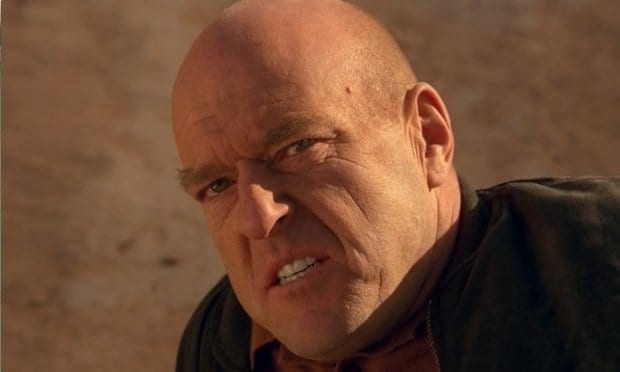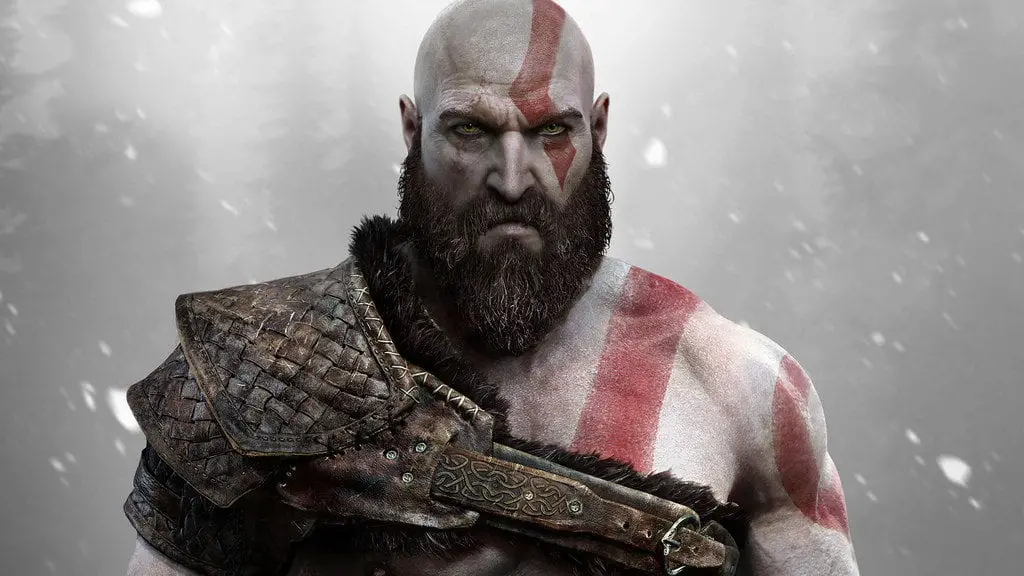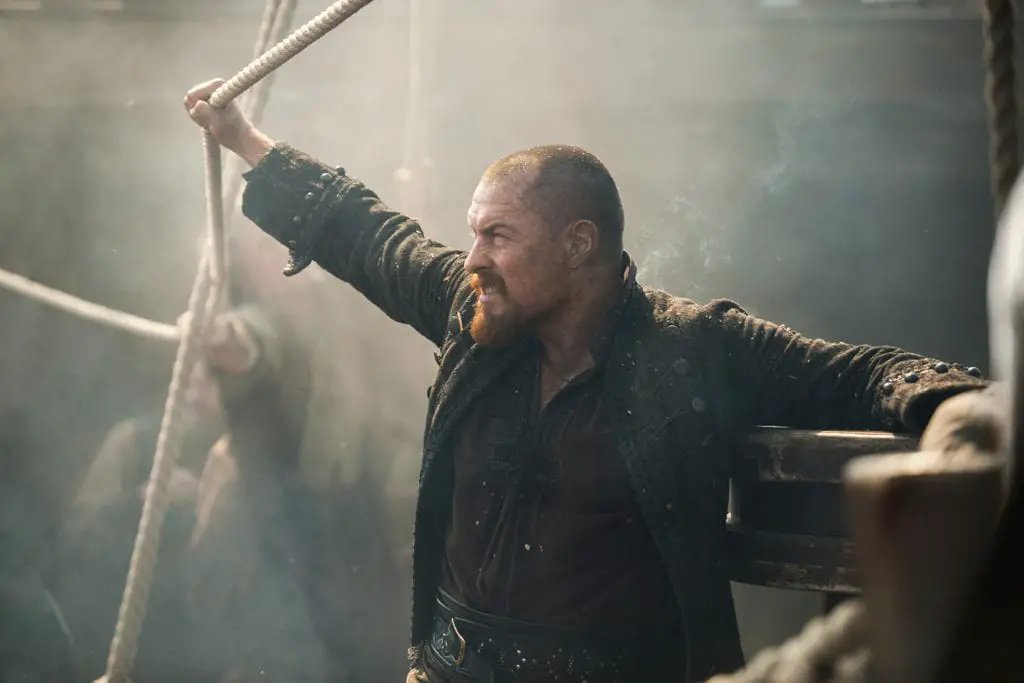Men often go to great lengths to battle hair loss. We use special shampoos, take pills, comb our hair in a multitude of ridiculous fashions to cover bald spots, and eventually plunk down money on awful toupees. In the end, we’re pretty vain creatures. Men battle to maintain whatever patches of hair we can atop our heads. We often fight knowing we fight in vain and the baldness wins in the end.
Is it any wonder so many bald guys end up being such toxically masculine jerks? So much effort and all for nothing. It makes you wonder. Think back on all the bad guys you’ve seen in your favorite stories in your life. I bet you could list at least five that are bald. Could the bane of toxic masculinity really be explained so simply? We have to dig deeper. We have to find the truth. In pursuit of this crucial goal, let’s take a look at some famous bald men and analyze just how big an impact hair has on the jerks they become.
Walter White and Hank Schrader (Breaking Bad)

I know I’m not exactly blowing anyone’s minds by starting here. The hypocritical murderer who would rather sell drugs than seek help paying for his cancer treatment is toxically masculine? Who knew? Walter White is the poster boy for toxic masculinity. There’s a reason to start here, though. Walter White serves as a good example of how hair loss (and gain) affects toxic masculinity in a man.
When we first see him, Walt doesn’t exactly scream toxic masculinity. He’s a timid chemistry teacher married to a strong woman that runs their household, and he agonizes for multiple days over whether to commit his first murder or not. Afterwards, he gives up the drug game because he realizes he isn’t cut out for it. He’s not exactly Steven Universe though. After all, he makes the decision to sell drugs while he still has a full head of hair. Walt also hides his cancer diagnosis and turns down Gretchen and Elliot’s offer to pay for his treatment. Still, he’s a more middling example of someone insecure over his failures in traditional gender roles than a full-blown, toxically masculine man.
When does this change? When he shaves his head. That same day he’s blowing up office buildings and grunting like a caveman pumped fresh full of steroids.
The following 5+ seasons see Walt’s toxicity only increase. He constantly monologues about a man’s responsibility to provide for his family. He shows off his ill-gotten wealth to his newborn daughter so she’ll “see what he did for her.” Despite the fact they’re all but divorced, Walt still feels ownership over his house and wife, Skyler, to the point he breaks into the house and throws a hissy fit when his wife sleeps with another man. When the two of them reconcile and Skyler attempts to seek some agency in her husband’s illicit business, Walt resents her for it.
Funnily enough, when he grows some hair back at the end, the toxicity recedes a bit. He recognizes his mistakes, apologizes to his wife, and vomits emotional honesty on her. He doesn’t change quite enough, though. Maybe if his hair grew back sooner.

While Hank wasn’t nearly as bad a person as Walt, he still fell into familiar characteristics of toxic masculinity. You know how toxically masculine men will do just about anything to bury their feelings, even from their loved ones, rather than show weakness? Yeah, that’s Hank to a tee. He refuses to talk to anyone about his PTSD in the aftermath of two traumatic events early on. He also has that same “refuse all help” pride that Walt does. His wife, Marie, doesn’t tell him about Walt paying for Hank’s physical rehab because she knows Hank would refuse that help. Rather than admit he’s scared of a promotion, he forces personal and professional trouble to make himself less viable a candidate.
However, where Hank falls even more into toxic masculinity is his entire personality. Namely how fake it is. For those who have seen Breaking Bad, you know what I’m talking about. Numerous times we see Hank as a completely different person around people than he is by himself. Throw him in a crowd and suddenly he’s the loud, crude, boisterous guy telling stories about how cool a bloody body was and how hot that lady is. Then he goes in an elevator and has a panic attack.
It’s always obvious that he’s putting on a fake persona because he thinks it’s expected of him. Because that’s how a man “should” act.
I suppose you could say Hank is a typical cop character. You can look back in TV history and find angry, toxic cops everywhere. Look at Vic Mackey on The Shield, after all. Thing is, there are plenty of cops on Breaking Bad and none of them come across like Hank. His best pal Steve Gomez is always willing to talk through Hank’s feelings. Hank’s boss at the DEA tries to work through Hank’s issues as well and openly admits his feelings when he finds out a friend, Gus Fring, was a drug kingpin.
What makes them different? Hair, obviously. Both Gomie and Hank’s boss have full heads of hair and glorious mustaches. Hank’s so bald he barely grows stubble. Looks to me like that’s the source of his insecurity and fake persona around his fellow DEA agents. He even warms to Walt once Walt shaves his head. He always teased and looked down on full-head-of-hair Walt. Maybe it’s the baldness that makes Hank so insecure and uber-macho.
Looks like sound logic to me.
Kratos (God of War)
Again, this is a total no-brainer. If Walter White is the poster boy for bald, toxically masculine men, than Kratos is like the God the entire religion worships. He’s literally nothing but buried feelings, violence, and disrespect towards women. His original games are misogynistic male fantasies of the highest order. Fun ones, but still. Kratos prioritizes military conquest over his family, eventually murders them, and rather than own up to his sins, he decides to “repent” by murdering some more.
The man has absolutely zero ability to express his emotions besides anger. By the time God of War III rolls around and ends, Kratos has murdered most of the Greek gods and doomed the world to an apocalypse because of his inability to process his emotions or face his trauma. Lovely.
So what does he add to this discussion besides the most obvious example of how lack of hair represents toxic masculinity? Well, his newest entry shows how hair gain reduces toxic masculinity. Even if it’s face hair rather than head hair.

2018’s God of War is a change for the series in many ways, Kratos and his appearance included. His bro patch, standard for any 18-to-22-year old misogynistic frat boy, was replaced with a full-on Viking Dad Beard. His personality changed to about the same degree. Make no mistake; he’s still a gruff, macho, angry guy capable of significant violence. However, he is also a calmer, more thoughtful person. He makes decisions to avoid killing and even fighting at all, sometimes. He gradually opens up emotionally to his son as God of War moves along.
Kratos and his son end the game in a much healthier and more communicative place. Truths are laid bare and a closer bond results. Kratos feel comfortable grieving more openly in front of Atreus.
Now he certainly still has a long way to go. That doesn’t change that you add a big, fluffy beard and Kratos suddenly becomes that bit fluffier a person. It’s a good step forward for an angry man. I’m not sure if he can ever fully shed his toxic masculinity, though. Maybe if his beard grows down to his chest or stomach? Or is there a point where the beard grows too long and the affect reverses?
Maybe we’ll find out in a sequel.
Captain James Flint (Black Sails)
Now here lies an interesting case study.
Don’t confuse James Flint with James McGraw. McGraw certainly has his anger issues, but he’s also an adorably soft bisexual who will proudly remain loyal to his boyfriend and openly confess feelings of love at dinner to said boyfriend’s bigot father. When he reunites with Thomas Hamilton after years of repressed pain and hidden feelings, they shamelessly make out in the middle of a field for all to see.
The last thing you could ever say about James McGraw is that he represses less “masculine” tendencies to come across like a “real man.” His other persona, James Flint, well, he’s a different story.
The central story of Black Sails revolves around Flint’s violent, single-minded quest for revenge against England after the “death” of Thomas Hamilton. He becomes a completely different person in order to blend in with the violent pirates inhabiting Nassau. Violence and fear and anger rule his personality. Flint adopts the most toxic of masculine traits in order to rise through the pirate ranks and maintain control of his ship.
He shares his secrets with no one but the third member of his romantic life, Thomas’s totally consenting wife Miranda. Not even she can break past the wall of repressed anger and grief Flint puts up since embarking on his pirate journey. Eventually she does break through to a former piece of what used to be James McGraw. Then a trigger-happy moron shoots her in the head.
Up to this point, Flint still has a glorious man-bun. In fact, you could argue Miranda Hamilton represents this retaining of his hair, which represents the retaining of that small bit of James McGraw. Miranda’s death coincidentally occurs around the time Flint decides to go with a buzzcut instead, shedding the last vestiges of his former life. Such amazing symbolism. No wonder we love Black Sails so much.

Buzzcut Flint becomes an even greater toxic monster, as you’d expect with such sudden loss of hair. His grief process becomes one of indiscriminate murder of soldiers and innocents. Towns fall beneath his inability to process grief. He fully adopts the pirate persona he pretended at before.
Say what you want about Flint’s methods while he still had hair, but at least he had some higher, non-violent goal in mind behind said actions. Namely, an independent Nassau like Thomas dreamed of. Buzzcut Flint had no such greater purpose. He wanted painful revenge against anyone associated with the empire responsible for his losses. He even stops putting effort into his style, because why would any real man care so much about his appearance? Especially if you don’t have a glorious head of hair to style.
In the end, of course, Thomas Hamilton is alive and James McGraw leaves Flint behind to reunite with his lost love. It just goes to show how you can shave the positive masculinity off your head, but you can’t shave the positive masculinity off your heart.
Red Forman (That 70s Show)
Not all toxic masculinity involves being a bad person. Here’s the perfect example of that. Red Foreman is a good man. He loves his wife, he loves his family, and in the end he tries to do right by them. Most of the people in Red’s life are better off for knowing him.
He also happens to be completely and irredeemably toxically masculine.
Red refuses emotional expression at all costs. Numerous times he spouts off about how real men don’t cry or admit feelings towards anyone, not even his wife. He punishes any attempt to voice feelings. Alcohol and yelling are the only acceptable forms of grief. His only role in raising his son is to yell at him and show him how to do manly things. All the actual emotional support falls to his wife. However, he dotes on his daughter since she’s just a girl. That is, until she reasonably moves in with a guy. Then all he has for her is the slut shaming.
At least he’s not homophobic? Though he’s not exactly comfortable with it, either, and views gay couples like a joke in one episode.
He’s the only character who acts so stringently toxic from beginning to end. He also happens to be the only main character without hair. His son, Eric, basically tells us the truth of it in an episode, when he theorizes that the gene for happiness is stored in hair. Eric isn’t like that. His friends can be sometimes, but nothing close to Red. Bob Pinciotti has his toxic moments, but he’s also a fountain of emotional expression.
The only thing common difference Red has with all these other characters is hair. Or rather, Red’s lack of it in comparison. He doesn’t even have the choice of cutting it like Walter White or James Flint. In an era of afros and long, luscious hairdos, Red’s stuck with the chrome dome. Does this mean his toxic masculinity is a result of insecurity in the face of so many pretty hairstyles? Or is Eric right, and there’s some genetic component to the discussion.
The evidence certainly appears to be piling up, huh?
Aang (Avatar: The Last Airbender)
![]()
Woah, woah! Calm down! I’m not saying Aang is a toxically masculine person. Clearly he’s not. He was raised to avoid violence when possible, to the point that he can’t even bring himself to kill a horrific dictator responsible for murdering thousands in an effort to conquer the world. Aang is kind, silly, emotionally open, and has no problem dressing up for a fun night dancing in the Fire Nation. I would never, ever accuse Aang of toxically masculine behavior.
Well, except in one case. That case being his evolving relationship with Katara throughout the course of Avatar: The Last Airbender.
This dynamic is the one place where even such a positively masculine kid like Aang displays toxic traits. The sense of ownership, the feeling of romantic competition, the hiding and/or shutting down of emotion, the feeling of having to conform to traditionally masculine roles…all of this shows up in Aang when it comes to his romantic pursuit of Katara. He becomes overprotective of her despite Katara’s obvious mastery of waterbending. When she faces serious danger, he responds with feelings of vengeance and anger.
Sounds like elements of a toxically masculine gumbo to me.
You can even argue the effect of his baldness on his parenting skills. A trait of toxic masculinity is the idea of leaving parenting to the mother. Anyone familiar with The Legend of Korra (if you aren’t, WHY! Go watch now. I’ll wait) knows how Aang’s parenting affected Bumi and Kya. Or rather, Aang’s lack of parenting. He has two children who seemingly have no idea whether their father actually loved them or not.
Compare that to how they view their mother, Katara. None of those hard feelings exist. Seems to me like she was a much larger presence in their life.
Again, I would never, ever consider Aang a toxically masculine person. But even he couldn’t fully escape the toxicity that accompanies baldness.
Counterpoint One: Luke Cage (Luke Cage)
Of course, you can’t conduct an actual examination of any topic without discussing some counterpoints. First up is Luke Cage, a man with the chromest of domes and yet lacking the vast majority of the traits seen in toxically masculine men. Yes, he tends not to discuss his trauma. Yeah, he punches the hell out of people.
However, when we first meet Luke he’s a peaceful bartender. He tries not to fight unless forced to. Even after the revelation that Jessica Jones killed his wife, he walks away rather than respond with violence. Within his own show, he embraces vulnerability and tries to be a role model inspiring Harlem’s youths away from the violent paths of the toxically masculine influences in their lives. He wants to use his invulnerability to protect rather than destroy.
His lack of toxic masculinity shows not just in his mission or attitude towards violence, but in his personality. It’s easy to look at Luke, see the big, muscular, bulletproof black dude and assume he’s all kinds of awful stereotypes. He turns out to be anything but. Luke is a funny, vulnerable, honest man. He has nothing but respect for women and shows zero hesitation to acknowledge their strength, even if their strength arguably outranks his. He shows a healthy emotional vulnerability around those he trusts.

The man is a big, loveable teddy bear.
Luke Cage defies many of the stereotypes expected of his appearance and abilities. Chief among them is toxic masculinity. Maybe baldness doesn’t have to turn you into a toxic jerk.
Counterpoint Two: Jaime Lannister (the real, A Song of Ice and Fire version)
This is a bit of a trickier one. I can’t say Jaime has turned a corner totally away from toxic masculinity. He still feels a deep possessiveness over his sister. He’ll probably always display a certain level of toxic masculinity just because of Westerosi culture. Just because he lost his ability to fight doesn’t change how he reveres that ability over anything else.
Still, compared to who Jaime used to be? Current Jaime might as well be Luke Cage.
Pre-Brave Companions Jaime represented the toxic ideal of Westerosi culture. He was arguably the deadliest fighter in the Seven Kingdoms and fully defined his life by his fighting ability. Everyone revered said ability. He had three kids he didn’t give a shit about because that was the job of their mother. His possessiveness over Cersei was even greater, to the point Jaime constantly considered killing his king. Sex with her overrode everything besides his obsession with fighting. And emotion? What even are emotions besides anger and lust?
Then Jaime loses his hand, meets Brienne of Tarth, and comes out the other side a changed man. He also shaves his head. Presumably he does this to disguise himself, but maybe it served as a transformation of his masculinity as well? While so many of my other examples became more toxic after shaving their heads, Jaime does not. He begins placing emphasis and worth on intellectual skills. He also begins showing more emotional vulnerability, including opening up to Brienne about the pivotal moment in his life: when he murdered Aerys Targaryen to save King’s Landing.
Through Brienne, he even gains a greater respect for women outside of their sexual worth.
While his transformation is not complete, and may never fully shed all of his toxic masculinity, there’s no question Jaime Lannister changed. Does losing his hand deserve more credit, or losing his hair? It’s an interesting question. One we may never fully answer, just like we may never know for sure whether baldness is responsible for toxic masculinity.

